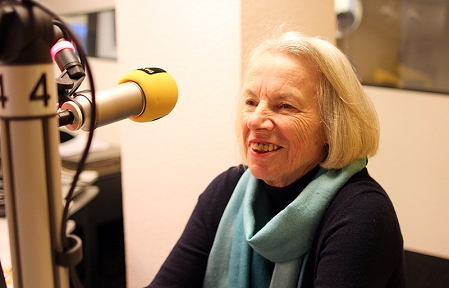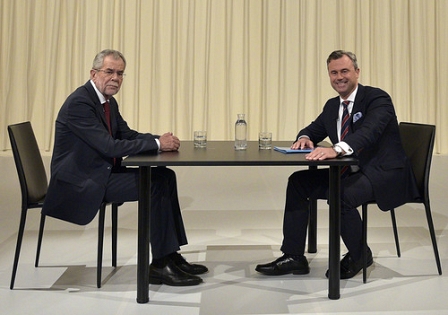Erstellt am: 23. 5. 2016 - 14:43 Uhr
"Everybody knows it’s a Nazi country, anyway"
FM4 Reality Check
Hear the programme in the FM4 Player or subscribe to the podcast and get the whole programme after the show
Steve Crilley: "Everybody is talking about Austria being split. Is this election and indication of a deeper rift in the country, when we talk about this word 'split'?"
Anneliese Rohrer: "I think this word 'split' or 'rift', quick frankly, in my opinion is bullshit. There are big changes underway, we haven’t come to terms with them, but they invent the word 'split' just because, for the first time, none of the big parties are involved, and you really had two opposites. But that is not because the country is split, that came about because the traditional parties, SPÖ and ÖVP, didn’t perform - their candidates didn’t get in. If you’d had Hofer with Kohl or the SPÖ candidate, the talk about a split wouldn’t be that drastic. I mean there are differences; there are shifts in the political landscape. Even if there was a rift, the President couldn’t smooth it out, it would have to be the government, with politics, that would deal with that rift, but again, I don’t think it’s a rift, I don’t think it’s a 'Spaltung', it’s a really substantial change in Austria."

Radio FM4
Steve Crilley: "After the first round everyone said Mr. Van der Bellen had a steep mountain to climb, and the feeling was that it’s just too hard. How did he manage to get where he is now, do you think?"
Anneliese Rohrer: "There was a surprise factor in the electorate, yesterday, and he managed to do that because he got all the cities. The common thinking was that the refugee situation is going to have a big influence and it’s going to help Hofer, and the violence that surfaced recently - all this is going to go in favour of Hofer. The actual result is, Van der Bellen got all the cities, and in Vienna he got those districts which have the biggest migrant and refugee problems. I think nobody saw that coming."
#BPW16
Die Bundes- Präsidentenwahl auf FM4.
50:50 - Offenes Rennen um die Hofburg
Kein klarer Sieger am Wahlabend: 50,0% für Alexander Van der Bellen - 50,0% für Hofer. Die Stichwahl geht in der Verlängerung, bis am Montag alle Wahlkarten ausgezählt sind.
Steve Crilley: "We’re going to have a result probably between 5 and 7 o’clock this afternoon - it’s obviously still going to be very tight when this result comes in, how likely do you think it is to be challenged by whoever doesn’t win?"
Anneliese Rohrer: "Well, in a very curious way, the FPÖ, and even Hofer himself, announced yesterday that they are going to challenge it. I mean, they announced this before the counting even started, so that to me, proves a certain mind-set: 'We’re going to challenge it, anyway'. The Greens, I think, maybe 100 votes and then they’d challenge it - the FPÖ is a different story."
Steve Crilley: "Say we have a President Hofer tomorrow. What is going to happen with that?"
Anneliese Rohrer: "Well, there’s a split! The consequences are twofold - internationally it’s going to be a big story, even if it’s only 50.01%, because they all have been waiting to brand Austria as the first one with a far right president, and 'everybody knows it’s a Nazi country, anyway', so the international damage will be felt, but I don’t think Hofer will play a big international role. In the country itself, for the moment, I think there will be no consequences, because with [just over 50%] he can’t think about dismissing the government. That’s out of the question. He could have thought about it if it were 58% or 60%, but not with such a close result. So, internally, I think the focus will shift again onto the government. I mean, what’s the government doing? The policies - you know, they are important. These two parties, do they get their acts together? Hofer, the President is, for the time being, not important. We can talk about constitutional changes, but that will take time. Immediately, the focus, in my opinion, is going to shift onto the government, and rightly so."

APA/ HANS PUNZ
Steve Crilley: "What does it actually mean for these two parties, the SPÖ and the ÖVP? What does this mean for the two major parties within Austria?"
Anneliese Rohrer: "Well, Christian Kern, the new Chancellor said it - it’s their last chance. Either they start working together, and they deal with all these problems, I mean, we’ve talked about it so many times - the job market, the schools, the universities, the economy - either they start dealing with these problems in a substantial way, so the public can see they are at least active, or they wait until they are voted out at the next election, whenever. It’s their choice, really. If they don’t do anything, they will be voted out, and justifiably."
Steve Crilley: "What about a possible President Van der Bellen tonight? If that is the case, are all the international journalists going to get on a plane and get out of here, and are we going to assume it’s business as usual?"
Anneliese Rohrer: "Yes, probably (laughs). I mean there will be some sort of aftermath, saying how it was very close, and almost… but if Van der Bellen wins, the international thing is going to die down until the next national election. Then, if Strache and the FPÖ loom on the horizon, they are going to come in again."
FM4 Reality Check
Monday to Friday from 12.00 to 14.00, Saturday from 12.00 to 13.00, and after the show via Podcast or fm4.orf.at/realitycheck.


